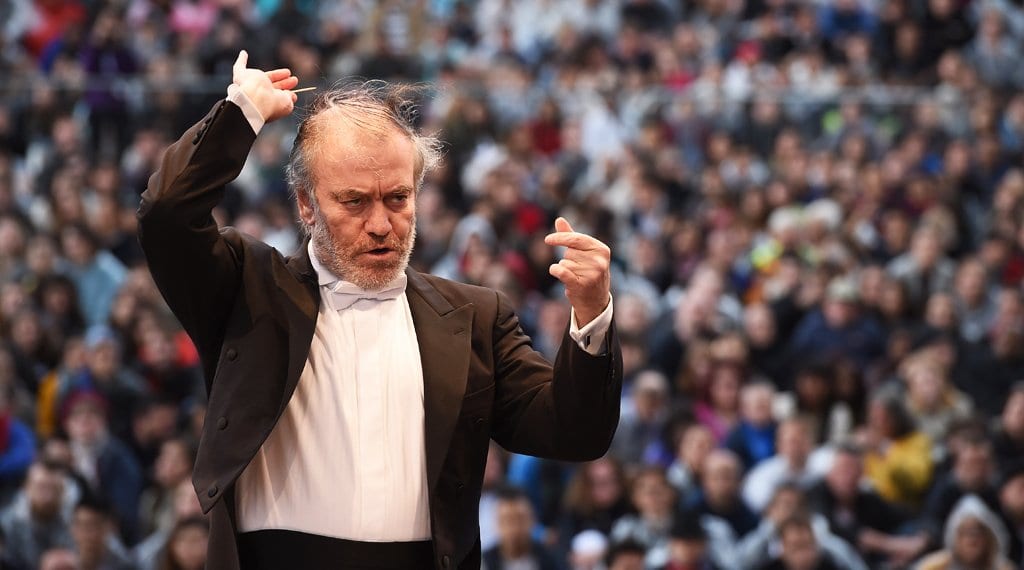The Russian conductor Valery Gergiev is perhaps the world’s most powerful classical musician.
As artistic and general director of the Mariinsky Theatre, one of the great Russian artistic institutions, Gergiev has become widely admired, fabulously wealthy and has cultivated deep ties to the Russian state, including President Vladimir Putin.
It’s that last bit that has some people opposing an upcoming performance that the Mariinsky Orchestra, with Gergiev at the helm, is scheduled to give at Roy Thomson Hall in Toronto in November 2017.
Egale Canada, an LGBT advocacy group, has sent a letter to the board of governors of the corporation of Massey Hall and Roy Thomson Hall, asking them to cancel the concert.
“You don’t get to dabble in politics and turn it off at the door of the arts,” says Helen Kennedy, the executive director of Egale Canada.
Kennedy notes that Roy Thomson Hall is heavily subsidized by Canadian taxpayers. “And I think they need to be a little bit more aware that you can’t support the arts at the cost of human rights,” she says.
Gergiev has become a frequent target of protesters when he performs in the West, especially because of comments he made that indicated support for the 2013 gay propaganda law that made it illegal to show homosexuality in a positive light in Russia.
“In Russia we do everything we can to protect children from paedophiles,” Gergiev told the Dutch newspaper Volkskrant in 2013. “This law is not about homosexuality, it targets paedophilia. But I have too busy a schedule to explore this matter in detail.”
After a protest at a performance in London, England, Gergiev denied that he was a supporter of the law.
“I have said before that I do not discriminate against anyone, gay or otherwise, and never have done, and as head of the Mariinsky Theatre this is our policy,” he wrote in a Facebook post. “It is wrong to suggest that I have ever supported anti-gay legislation and in all my work I have upheld equal rights for all people.”
He has also condemned Pussy Riot, the feminist Russian punk band whose members were imprisoned for performing in a Moscow church, claiming they were only looking at “earning millions and millions.”
“The upcoming presentation of the Mariinsky Orchestra is a celebration of music and intended to bring people together with one of the world’s most esteemed musical ensembles,” reads a statement sent to Xtra from Roy Thomson Hall. “We acknowledge and respect the concerns raised by Egale and have reached out to them to discuss.”
Politics and arts
Since he became the principal conductor of the Mariinsky Orchestra in 1988, Gergiev has revived the once-flagging institution into one of Russia’s most prominent cultural exports.
He has played an important role in popularizing composers from the Soviet era, including Sergei Prokofiev and Dmitri Shostakovich, and has achieved a level of celebrity in the world of classical music that is not often seen.
In 2013, Gergiev made around $16.5 million, more than any other musician in Russia, eclipsing even Russian pop stars.
But due to his close relationship with Putin, who he has known since 1992, Gergiev has often been portrayed as a tool of Russian propaganda.
“I don’t know of any case in musical history, except maybe for Wagner and Mad King Ludwig of Bavaria, where a musician has been that close to a powerful ruler,” Richard Morrison, the chief classical music critic of The Times of London, told The New York Times in 2009.
Gergiev has often been a supporter of Russian political aims, both through his music and words.
In 2008, Gergiev performed a symphony in Tskhinvali, the capital of South Ossetia in Georgia, a week after the Russian invasion, in which he praised the Russian army. When Russia annexed Crimea from Ukraine in 2014, he signed a petition in support of the invasion.
And last year, Gergiev led a performance of the Mariinsky Orchestra in the ruins of Palmyra, an ancient Roman city in Syria, after it had been recaptured by the Russia-backed Syrian government.
Gergiev has performed in Toronto many times, including a show with the Mariinsky Orchestra in 2013 at Roy Thomson Hall. However, that was before his comments about the gay propaganda law were made public and his performances began to be protested.
Gergiev and the Mariinsky Orchestra did not reply to a request for comment.

 Why you can trust Xtra
Why you can trust Xtra


